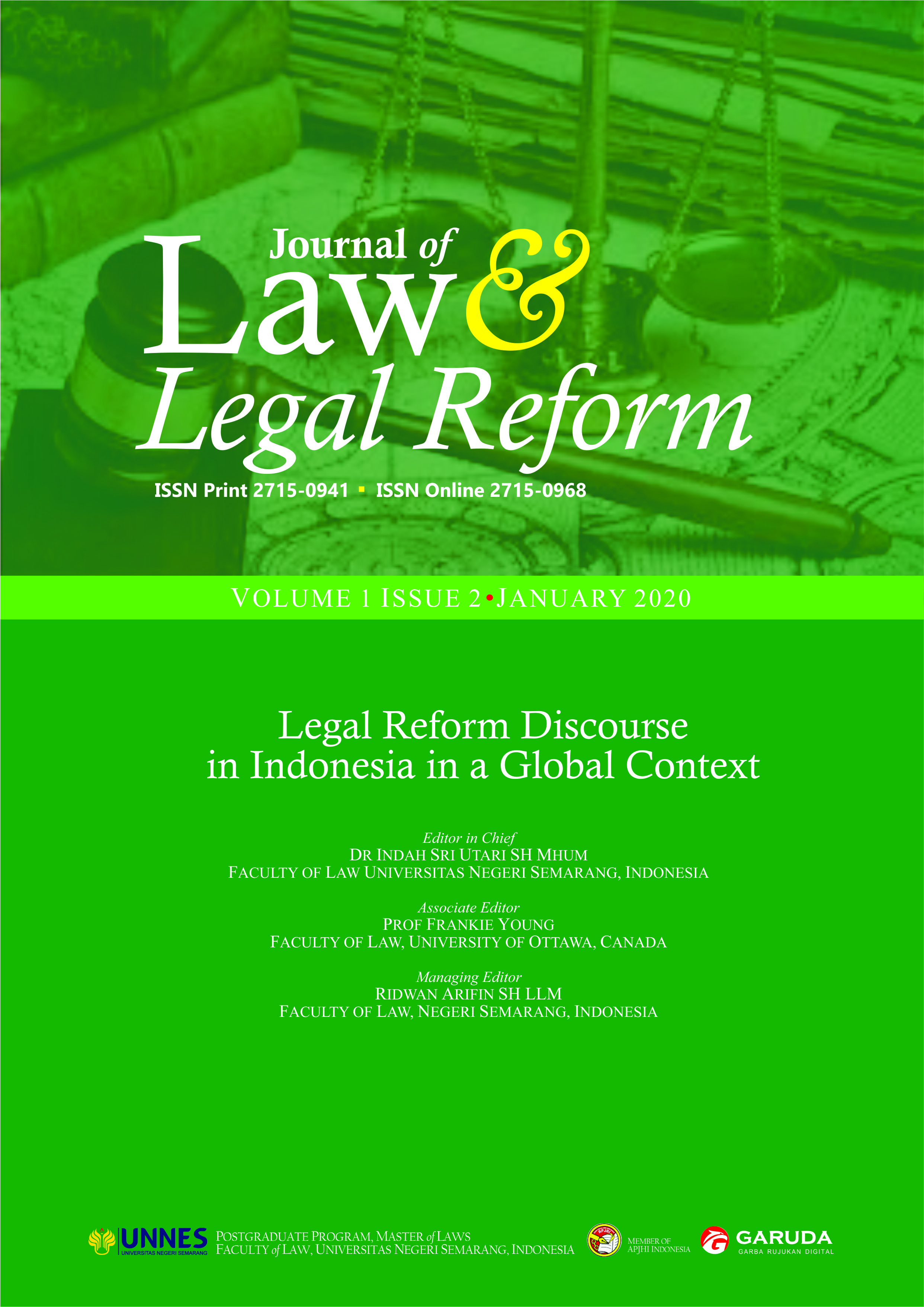Penal Mediation as Alternative Dispute Resolution: A Criminal Law Reform in Indonesia
Main Article Content
Abstract
In the minor crime, the solving of cases process through formal process in the court is the prosess that is taking much cost and long time it aint suitable with detriments of the crime impact, these all are contrary with the principal fast, simple and unexpensive judicature. Writing this thesis aims to know the legal certainty of implementing Penal Mediation as an Alternative Dispute Resolution and prospects of applying Alternative Dispute Resolution in the Indonesian Criminal Justice System. The approach used in this research is a qualitative research approach that produces descriptive data in the form of people's written or oral words and observable behavior. The type of research that will be used in this research is doctrinal research. Penal mediation is an alternative form of resolving disputes outside the court (commonly known as ADR or "Alternative Dispute Resolution" and some call it "Apropriate Dispute Resolution"). Penal mediation for the first time is known in positive legal terminology in Indonesia since the issuance of KAPOLRI No. Pol: B / 3022 / XII / 2009 / SDEOPS dated December 14, 2009 concerning Handling Cases through Alternative Dispute Resolution (ADR), even though they are partial. In essence, the principles of mediation of the penalties referred to in this KAPOLRI letter emphasize that the settlement of criminal cases using ADR, must be agreed by the parties that litigate, but if there is no new agreement resolved in accordance with applicable legal procedures in a professional and proportional manner.
Article Details
All writings published in this journal are personal views of the authors and do not represent the views of this journal and the author's affiliated institutions. Author(s) retain copyrights under a Creative Commons Attribution-NonCommercial-ShareAlike 4.0 International (CC BY-NC-SA 4.0).
References
Andrew, J. S. (2001). Making or breaking alternative dispute resolution? Factors influencing its success in waste management conflicts. Environmental Impact Assessment Review, 21(1), 23–57. https://doi.org/10.1016/S0195-9255(00)00074-3
Arief, Barda Nawawi. Kebijakan Legislatif dalam Penanggulangan Kejahatan dengan Pidana Penjara. Semarang: Badan Penerbit Universitas Diponogoro, 2002.
Arief, Barda Nawawi. Masalah Penegakkan Hukum dan Kebijakan Hukum Pidana dalam Penanggulangan Kejahatan. Jakarta: Kencana, 2007.
Arief, Barda Nawawi. Mediasi Penal: Penyelesaian Perkara Pidana di Luar Pengadilan. Semarang: Pustaka Magister, 2012
Choi, J. J., Bazemore, G., & Gilbert, M. J. (2012). Review of research on victims’ experiences in restorative justice: Implications for youth justice. Children and Youth Services Review, 34(1), 35–42. https://doi.org/10.1016/j.childyouth.2011.08.011
Dekker, S. W. A., & Breakey, H. (2016). “Just culture:†Improving safety by achieving substantive, procedural and restorative justice. Safety Science, 85, 187–193. https://doi.org/10.1016/j.ssci.2016.01.018
Fan, H., & Li, H. (2013). Retrieving similar cases for alternative dispute resolution in construction accidents using text mining techniques. Automation in Construction, 34, 85–91. https://doi.org/10.1016/j.autcon.2012.10.014
Fanani, Ahwan M. Mukhsin Jamil dan Isna Husnia Sari (eds.). Mengelola Konflik Membangun Damai. Semarang: Walisongo Mediation Centre, 2015.
Fathurokhman, F. (2013). The Necessity of Restorative Justice on Juvenile Delinquency in Indonesia, Lessons Learned from the Raju and AAL Cases. Procedia Environmental Sciences, 17, 967–975. https://doi.org/10.1016/j.proenv.2013.02.115
Hamzah, Andi. KUHP & KUHAP. Jakarta: Rineka Cipta, 2012.
Iqbal Felisiano dan Amira Paripurna, “Profesionalisme POLRI dalam Penerapan Wewenang Diskresi dalam Kasus Tindak Pidana Pencurian (Studi Kasus Pencurian Kakao, Pencurian Biji Kapuk dan Pencurian Semangka)â€, Jurnal Yuridika, Vol. 25 No. 3, (September–Desember 2010).
James Hasudungan Hutajulu, Prija Djatmika, Ismail Navianto, Mediasi Penal sebagai Alternatif Penyelesaian Perkara Pencurian Ringan (Studi di POLRES Malang Kota), Program Magister Ilmu Hukum Fakultas Hukum Universitas Brawijaya.
Knudsen, L. F., & Balina, S. (2014). Alternative Dispute Resolution Systems Across the European Union, Iceland and Norway. Procedia - Social and Behavioral Sciences, 109, 944–948. https://doi.org/10.1016/j.sbspro.2013.12.569
Lee, C. K., Yiu, T. W., & Cheung, S. O. (2016). Selection and use of Alternative Dispute Resolution (ADR) in construction projects - Past and future research. International Journal of Project Management, 34(3), 494–507. https://doi.org/10.1016/j.ijproman.2015.12.008
Marlina. Peradilan Pidana Anak di Indonesia (Pengembangan Konsep Diversi dan Restorative Justice). Bandung: Refika Aditama, 2009.
Matsumoto, S. (2011). A duration analysis of environmental alternative dispute resolution in Japan. Ecological Economics, 70(4), 659–666. https://doi.org/10.1016/j.ecolecon.2010.10.014
Mbanzoulou, P., Cario, R., & Bouchard, J. P. (2019). The psychological dimension of restorative justice. Annales Medico-Psychologiques, 177(6), 597–604. https://doi.org/10.1016/j.amp.2019.04.003
Menkel-Meadow, C. J. (2015). Mediation, Arbitration, and Alternative Dispute Resolution (ADR). In International Encyclopedia of the Social & Behavioral Sciences: Second Edition (Second Edition, Vol. 15). https://doi.org/10.1016/B978-0-08-097086-8.86083-3
Mohammad, T., Azman, A., & Anderstone, B. (2019). The global three: A Malaysian lens on the challenges and opportunities facing restorative justice planning and implementation. Evaluation and Program Planning, 72(April 2018), 1–7. https://doi.org/10.1016/j.evalprogplan.2018.09.007
Mulyadi, Lilik. Mediasi Penal dalam Sistem Peradilan Pidana Indonesia: Pengkajian Asas, Norma, Teori dan Praktik. Jurnal Yustisia Vol.2 No.1 (Januari–April2013).
Nur, Efa Rosdiah. Alternatif Peyelesaian Perkara Pidana Dalam Perspektif Hukum IslamSebagai Media Menuju Keadilan, Lampung: Jurnal Masalah-masaah Hukum, Jilid 45 Nomor 2, 2016.
Prayitno, Kuat Puji. Restorative Justice untuk Peradilan di Indonesia (Perspektif Yuridis Filosofis dalam Penegakkan Hukum In Concreto). Purwokerto: Jurnal Dinamika Hukum, Vol 12 Nomor 3, 2012.
Rahardjo, Satjipto. Ilmu Hukum. Bandung: Citra Aditya Bakti, 2012.
Ramzy, Ahmad. Perdamaian dalam Hukum Pidana Islam dan Penerapan Restorative Justice dikaitkan dengan Pembaruan Hukum Pidana di Indonesia. Tesis Program Pasca Sarjana Universitas Indonesia. Jakarta, 2012.
Setiadi, Edi. Perkembangan Hukum Pidana di Indonesia. Yogyakarta: Graha Ilmu, 2013.
Spurr, S. J. (2000). The role of nonbinding alternative dispute resolution in litigation. Journal of Economic Behavior and Organization, 42(1), 75–96. https://doi.org/10.1016/s0167-2681(00)00075-5
Ward, T., & Langlands, R. L. (2008). Restorative justice and the human rights of offenders: Convergences and divergences. Aggression and Violent Behavior, 13(5), 355–372. https://doi.org/10.1016/j.avb.2008.06.001
Witvliet, C. V. O., Worthington, E. L., Root, L. M., Sato, A. F., Ludwig, T. E., & Exline, J. J. (2008). Retributive justice, restorative justice, and forgiveness: An experimental psychophysiology analysis. Journal of Experimental Social Psychology, 44(1), 10–25. https://doi.org/10.1016/j.jesp.2007.01.009
